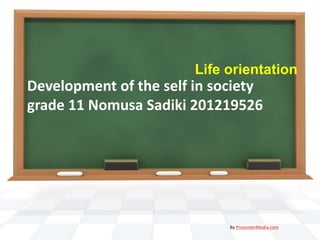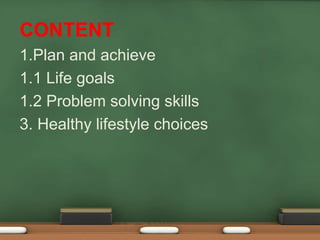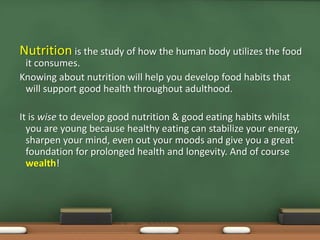Development of the self in society grade 11
- 1. Development of the self in society grade 11 Nomusa Sadiki 201219526 Life orientation By PresenterMedia.com
- 2. CONTENT 1.Plan and achieve 1.1 Life goals 1.2 Problem solving skills 3. Healthy lifestyle choices
- 4. ŌĆóWhat are goals ’é× Goals: those things you aim for that take planning and work. ’é× Short-Term Goal: a goal that you can reach in a short period of time. ’é× Long-Term Goal: a goal that you plan to reach over an extended period of time. ’é× Action plan: a multi-step strategy to identify and achieve your goals
- 5. ’é× Take control of your life ’é× Focus on the important things ’é× Make good decisions ’é× Finish tasks efficiently ’é× Builds self-confidence ’é× Sense of accomplishment ’é× Make progress toward bigger goals ’é× Setting the goal is half of the work toward achieving the goal ŌĆóWhy have goals
- 7. ŌĆó S (Specific) ŌĆó M (Measurable) ŌĆó A (Attainable) ŌĆó R (Realistic) ŌĆó T (Timely) ŌĆóSmart
- 11. Realistic
- 12. ŌĆóTŠ▒│Š▒▒¶▓Ō
- 14. Problems cannot be solved by thinking within the framework in which the problems were created. Albert Einstein
- 15. Define the Problem Evaluate Alternatives Implement the chosen Alternative Gather facts and develop alternatives. Select the best alternative. Follow up and evaluate the chosen alternative.
- 16. ŌĆóProblem solving de bonoŌĆÖs way
- 17. ŌĆó Identify problem ŌĆó Define Objective ŌĆó Make a pre-decision ŌĆó Generate alternatives ŌĆó Evaluate alternatives ŌĆó Make a choice ŌĆó Implement choice ŌĆó Follow up ŌĆóGeneral ways of solving a problem
- 20. Eating healthy foods and exercing regularly
- 21. ŌĆóNutrient Balance ŌĆó Carefully planned nutrition must provide an energy balance and a nutrient balance. ŌĆó The nutrients are: ŌĆó Proteins - essential to growth and repair of muscle and other body tissues ŌĆó Fats - one source of energy and important in relation to fat soluble vitamins ŌĆó Carbohydrates - our main source of energy ŌĆó Minerals - those inorganic elements occurring in the body and which are critical to its normal functions ŌĆó Vitamins - water and fat soluble vitamins play important roles in many chemical processes in the body ŌĆó Water - essential to normal body function - as a vehicle for carrying other nutrients and because 60% of the human body is water ŌĆó Roughage - the fibrous indigestible portion of our diet essential to health of the digestive system
- 22. The Most Critical Nutrient! ŌĆó Functions in transport, chemical reactions, temperature maintenance, lubrication, etc. ŌĆó Water deprivation ---> dehydration ---> electrolyte imbalance ---> death. ŌĆó Requirements vary from one species to another. For example, the desert rat requires very little, while the dairy cow may require 25-29 gallons/day. ŌĆó Management problems leading to lack of water
- 23. Nutrition is the study of how the human body utilizes the food it consumes. Knowing about nutrition will help you develop food habits that will support good health throughout adulthood. It is wise to develop good nutrition & good eating habits whilst you are young because healthy eating can stabilize your energy, sharpen your mind, even out your moods and give you a great foundation for prolonged health and longevity. And of course wealth!
- 24. LetŌĆÖs Call It A Day
- 25. ŌĆó Alan Barke www.kairostraining.co.uk ŌĆó by Orlanda Sebro www.healthyliving.co.uk ŌĆóReferences

























